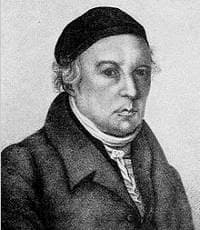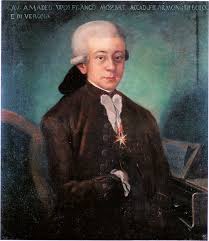
Prince Carl Lichnowsky
A curious entry was found in a Logbook of the Special Court of Aristocrats in Vienna dated 12th November 1791. It states, “Prince Karl Lichnowsky in his case against K.K.Hof Kappelmeister Wolfgang Amadeus Mozart, owing to indebtedness of 1,435 Gulden 32 Kreuzer along with court costs of 24 Gulden, has shown cause for both attachment and withholding of the half of his salary.” The document appears to show that the aristocratic friend and fellow Freemason, Prince Karl Lichnowsky had sued Mozart over a debt and won a judgment of 1,435 florins and 32 Kreutzer in Austrian currency of the time weeks before the composer died. The debt owed to Prince Karl Lichnowsky was found uncollectable, and the reason for the lawsuit has since been hotly debated.
Wolfgang Amadeus Mozart: String Quintet No. 4, K. 516 – I. Allegro (Tokyo String Quartet; Pinchas Zukerman, viola)

Michael Puchberg
Mozart frequently expressed financial desperation in a series of letters at the time. “Without your help,” he writes to the fellow Freemason, Michael Puchberg in July 1789, “the honor, peace of mind and perhaps the life itself of your friend and brother Mason will perish.” Mozart had been asking Puchberg for money since Jun 1788, begging “If you have sufficient regard and friendship for me to assist me for a year or two with one or two thousand gulden, at a suitable rate of interest, you will help me enormously.” And ten days later he writes, “I am unavoidably obliged to raise money somehow. But good God, in whom can I confide? In no other but you, my best friend!… I should like a fairly substantial sum for a somewhat longer period.” Mozart might have been in occasional financial dire straits, but he was not a pauper. During the last five years of his life his total recorded earnings amounted to 12,366 gulden, averaging 2,473 gulden annually. Added to this were sums of money earned through recitals and publications bringing his income between 1782 and 1791 to a healthy 4000 gulden annually. Given that a physician at a major Viennese hospital received the sum of 600 gulden a year, Mozart was financially well off.
Wolfgang Amadeus Mozart: String Quintet No. 4, K. 516 – II. Menuetto (Tokyo String Quartet)
Wolfgang Amadeus Mozart: String Quintet No. 4, K. 516 – III. Adagio ma non troppo (Tokyo String Quartet)

Mozart and Constanze
Mozart certainly liked his little luxuries, expensive clothes and household furnishings. However, according to Leopold Mozart, Constanze run a very frugal household and kept a tight reign on money. As such, it has been speculated that Mozart needed large infusions of money to fuel a persistent gambling habit. There is some documentary evidence that Mozart liked a bit of gambling, but we do know for sure that his friend Prince Karl Lichnowsky lost large amounts of money in gambling halls and casinos. It has been proposed that Mozart’s debt to Lichnowsky stemmed from a loan of 1,000 Thalers connected with a trip the two men made to Berlin. On that trip, however, it was Mozart who had given Lichnowsky 100 florins, as he writes to Constanze. “Lichnowsky left me here and so I had to pay for my keep in Potsdam, which is an expensive place. I had to lend him a hundred florins, as his purse was getting empty. I could not well refuse him, YOU WILL KNOW WHY.” Gambling debts were not discussed openly, and regarded as family secrets.
Wolfgang Amadeus Mozart: String Quintet No. 4, K. 516 – IV. Adagio (Tokyo String Quartet)

Mason Mozart
Mozart’s debt to Lichnowsky, amounting to nearly half his annual salary, is not mentioned by Constanze Mozart nor by her second husband Georg Nissen, who wrote a comprehensive Mozart Biography. It is also puzzling why a wealthy prince would go to court to recover money he might easily have lost in one night’s gambling? An intriguing hypothesis suggests that Lichnowsky had prosecuted Mozart because of a scandal that had cost his relatives a lot of money. So what was the scandal referred to only once in the Mozart literature? It is said that Mozart fathered a daughter with a married woman. Countess Thun, a relative of Karl Lichnowsky, adopted that child at the time of Mozart’s death. And Lichnowsky had simply sued Mozart for expenses related to his little secret. Until we find more information either way, this court case is not yet closed.
For more of the best in classical music, sign up for our E-Newsletter
Wolfgang Amadeus Mozart: String Quintet No. 4, K. 516 – V. Allegro (Tokyo String Quartet; Pinchas Zukerman, viola)
